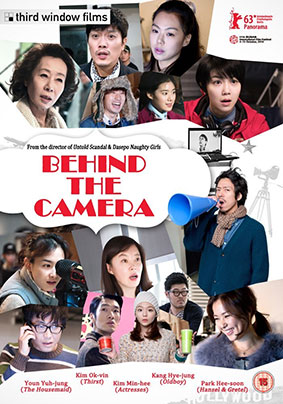Seoul, the present day. Director E J-yong, commissioned to make a promo for a new smartphone, has the idea of making it the world's first film directed remotely via internet link-ups rather than in person on set. While she is still shooting Im Sang-soo's The Taste of Money, he invites veteran actress Yun Yeo-jeong to take the lead role alongside a cast of other well-known actors. As the cast assembles in the studio, E addresses them on an internet link from Los Angeles, saying he needs the help of all his friends for him to break into Hollywood. The film, How To Fall In Love In Ten Minutes, is to be shot in only two days and will be only 10 minutes long. Some are excited to be part of the experiment, others are more dubious. As everyone struggles with the process and mounting technical problems, people start listening to E less and less, and an air of mutiny starts to spread through the disgruntled set.
Since his successful debut in 1998 with An Affair, director E J-yong has proven his knack for capturing shocking or controversial material in an elegant, innovative style, in films such as Asako in Ruby Shoes, Untold Scandal and Dasepo Naughty Girls. The modern, minimalistic melodrama An Affair told the story of forbidden love between a woman and her younger sister’s boyfriend. The provocative Joseon Dynasty piece Untold Scandal captivated audiences worldwide with its elegant visual aesthetic, and Dasepo Naughty Girls’s brilliant art and musical performances resulted in a delightful interpretation of taboo sex talk. His most recent film, The Actresses, provided full disclosure of the deepest thoughts and secrets of some of Korea’s most renowned actresses, leaving audiences bewildered about the boundaries of truth and fiction within the film.
Known for just this kind of innovation in each of his films, E J-yong returns with Behind the Camera (aka: Behind the Camera: Why Mr. E Went to Hollywood), capturing a director’s unprecedented attempt to direct a film entirely from an off-set location. Behind the Camera reveals the true behind-the-scenes nature of actors who find themselves without a director to guide them on set, as well as the chaotic and unforeseeable circumstances that arise as a result.
Director E J-yong said of the film:
Inspiration for a film always comes suddenly and unexpectedly in my case. I received an offer to direct a short film for an electronics company and began toying with some concepts. On one such day, a long cruise through the Web left me convinced that all sorts of information could readily be available to anyone with access to the Internet. With such well-established and convenient systems of communication, couldn’t a director make a film without having to be physically on set? It would mean refuge from the hectic film set, where all eyes are fixed on the director. It meant that I could direct away from the multitude of problems that would arise in the comfort of a warm, heated room. I found no reason to refuse such favorable conditions, especially in sub-zero temperatures. These thoughts were how Behind the Camera came to be. Although copious words depicting “innovation in filmmaking” or “experimenting with film conventions” were not spared to those who asked. And so the project began, and I experienced something truly new and utterly unexpected. This film is the account of that experience.

Behind the Camera will be released on UK DVD on 28th July 2014 by Third Window Films at the RRP of £14.99.
Special features will include:
|